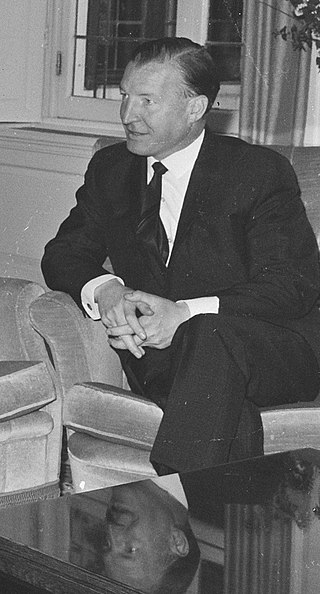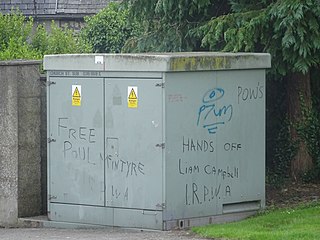
Gerard Adams is an Irish republican politician who was the president of Sinn Féin between 13 November 1983 and 10 February 2018, and served as a Teachta Dála (TD) for Louth from 2011 to 2020. From 1983 to 1992 and from 1997 to 2011, he followed the policy of abstentionism as a Member of Parliament (MP) of the British Parliament for the Belfast West constituency.

Desmond Joseph O'Malley was an Irish politician who served as Minister for Industry and Commerce from 1977 to 1981 and 1989 to 1992, Leader of the Progressive Democrats from 1985 to 1993, Minister for Trade, Commerce and Tourism from March 1982 to October 1982, Minister for Justice from 1970 to 1973 and Government Chief Whip and Parliamentary Secretary to the Minister of Defence from 1969 to 1970. He served as a Teachta Dála (TD) for the Limerick East constituency from 1968 to 2002.
The Government of the 25th Dáil or the 20th Government of Ireland was the government of Ireland formed after the 1987 general election on 17 February 1987. It was a minority Fianna Fáil government which had the qualified support of Fine Gael, the main opposition party, an arrangement known as the Tallaght Strategy after a speech by its leader Alan Dukes. The national debt had doubled under the previous government. The government introduced budget cuts in all departments. The taxation system was also reformed. One of the major schemes put forward was the establishment of the International Financial Services Centre (IFSC) in Dublin. During this period the Government organised the 1,000-year anniversary of the founding of Dublin.

On 12 October, 1984, the Provisional Irish Republican Army (IRA) attempted to assassinate members of the British government at the Grand Hotel in Brighton, England. A long-delay time bomb was planted in the hotel by Patrick Magee before Prime Minister Margaret Thatcher and her cabinet arrived for the Conservative Party conference. Five people were killed, including the Conservative MP and Deputy Chief Whip Sir Anthony Berry, and a further 31 were injured. Thatcher narrowly escaped the explosion.

The Anglo-Irish Agreement was a 1985 treaty between the United Kingdom and the Republic of Ireland which aimed to help bring an end to the Troubles in Northern Ireland. The treaty gave the Irish government an advisory role in Northern Ireland's government while confirming that there would be no change in the constitutional position of Northern Ireland unless a majority of its citizens agreed to join the Republic. It also set out conditions for the establishment of a devolved consensus government in the region.
The Guildford Four and Maguire Seven were the collective names of two groups of people, mostly Irish, who were wrongly convicted in English courts in 1975 and 1976 for the Guildford pub bombings of 5 October 1974, and the Woolwich pub bombing of 7 November 1974. All the convictions were eventually quashed after long campaigns for justice, and the cases, along with those of the Birmingham Six, shattered public confidence in the integrity of the English criminal justice system.
John Loyola Murray was an Irish judge who served as Chief Justice of Ireland from 2004 to 2011, a judge of the Supreme Court from 1999 to 2015, a judge of the European Court of Justice from 1992 to 1999 and as Attorney General of Ireland from August 1982 to December 1982 and 1987 to 1991.
Events from the year 1992 in Ireland.

The 1996 Manchester bombing was an attack carried out by the Provisional Irish Republican Army (IRA) on Saturday, 15 June 1996. The IRA detonated a 1,500-kilogram (3,300 lb) lorry bomb on Corporation Street in the centre of Manchester, England. It was the biggest bomb detonated in Great Britain since the Second World War. It targeted the city's infrastructure and economy and caused significant damage, estimated by insurers at £700 million, a sum surpassed only by the 1993 Bishopsgate bombing, also by the IRA.

The Arms Crisis was a political scandal in the Republic of Ireland in 1970 in which Charles Haughey and Neil Blaney were dismissed as cabinet ministers for alleged involvement in a conspiracy to smuggle arms to the Irish Republican Army in Northern Ireland. At the ensuing Arms Trial, charges against Blaney were dropped, and Haughey, along with co-defendants Captain James Kelly, John Kelly and Belgian businessman Albert Luykx, were found not guilty of conspiracy. Blaney claimed that the then government knew about the plan, while Haughey denied this.

The Remembrance Day bombing took place on 8 November 1987 in Enniskillen, County Fermanagh, Northern Ireland. A Provisional Irish Republican Army (IRA) bomb exploded near the town's war memorial (cenotaph) during a Remembrance Sunday ceremony, which was being held to commemorate British military war dead. Eleven people were killed, many of them elderly, and 63 were injured. The IRA said it had made a mistake and that its target had been the British soldiers parading to the memorial.
Patrick Joseph Magee is a former Provisional Irish Republican Army (IRA) volunteer, best known for planting a bomb in the Brighton Grand Hotel targeting Prime Minister Margaret Thatcher and her Cabinet, which killed five people. He is often referred to as the Brighton bomber.

The Hyde Park and Regent's Park bombings were carried out on 20 July 1982 in London, England. Members of the Provisional Irish Republican Army (IRA) detonated two improvised explosive devices during British military ceremonies in Hyde Park and Regent's Park, both in central London.

The Colombia Three are three individuals – Niall Connolly, James Monaghan, and Martin McCauley – who are currently living in the Republic of Ireland, having fled from Colombia where they had been sentenced to prison terms of seventeen years in 2003 on terrorism charges for training FARC rebels. The incident came during a crucial time in the Northern Ireland peace process and risked damaging it. The three were granted amnesty by a Colombian special court in April 2020. On December 16, 2022, the Special Jurisdiction for Peace revoked the amnesty citing that the trio had not fully divulged the truth about their trip to Colombia in 2001.

Liam Campbell is an Irish republican from Dundalk, County Louth. He was found liable under civil proceedings for the 1998 Omagh bombing, which killed 29 people.

Desmond Ellis is an Irish Sinn Féin politician who has been a Teachta Dála (TD) for the Dublin North-West constituency since the 2011 general election. During the 1970s and 1980s Ellis was a member of the Provisional IRA until his arrest in Ireland in 1981. Ellis subsequently fled Ireland before being recaptured in the United States and returned to Irish authorities. In 1983 Ellis was found guilty of possessing materials used to make explosive devices for the IRA and was sentenced to 10 years imprisonment by an Irish court. In 1990 Ellis was the first person extradited from the Republic of Ireland to the United Kingdom under the 1987 Extradition Act, on charges of terrorism on charges related to the 1982 Hyde Park and Regent's Park bombings as well as the 1983 Harrods bombing, however Ellis was acquitted of these charges in 1991. Ellis moved into constitutional politics in 1999 when he was elected to Dublin City Council, a position he held until he was elected to his current position as a Teachta Dála.
Donna Maguire is a former volunteer in the Provisional Irish Republican Army (IRA) once described as Europe's most dangerous woman.
On 9 April 1990, the South Down Brigade of the Provisional Irish Republican Army (IRA) detonated a massive improvised land mine under a British Army convoy outside Downpatrick, County Down, Northern Ireland. Four soldiers of the Ulster Defence Regiment (UDR) were killed, the regiment's greatest loss of life since 1983.
The Slovak Three were Irishmen Michael Christopher McDonald, Declan John Rafferty and Fintan Paul O'Farrell, who were members of the Real IRA. They were arrested in a sting operation in Slovakia conducted by British security agency MI5 in 2001 after they were caught attempting to buy arms for their campaign. They believed they were purchasing weapons from Iraqi intelligence agents and that Saddam Hussein was to play a role in the Real IRA similar to the one Colonel Gadaffi had in its predecessors the Provisional IRA. The three men met in Piešťany, a spa town in Western Slovakia, after months of meetings and telephone calls—all of which were intercepted and overheard by MI6. Believing its case to be now fireproof, MI5 had passed details of the men and their intentions to the Slovak authorities, who ambushed the men on the evening of 5 July 2001 after their meeting. They were arrested and imprisoned in the expectation Slovakia would receive a formal extradition request from the UK.











